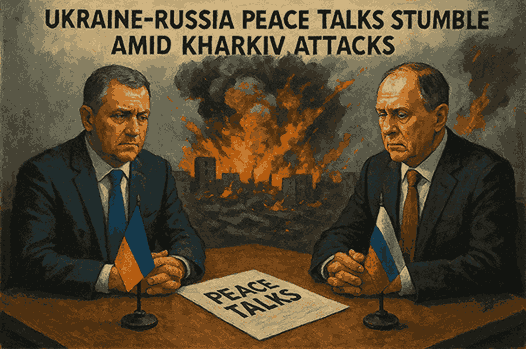In the midst of renewed diplomatic efforts between Ukraine and Russia, recent developments have highlighted the fragile and often contradictory state of ongoing peace talks. As both nations met in Istanbul to negotiate humanitarian exchanges and potential ceasefire steps, fierce missile and drone attacks in Kharkiv have underscored the enduring volatility of the conflict.
Prisoner Swap Agreement: A Humanitarian Step Forward?
A key focal point of the recent talks was the negotiation of a large-scale prisoner exchange. Both sides tentatively agreed to release 500 prisoners each, as a preliminary phase of a larger 1,000-for-1,000 swap.
However, despite the agreement, tensions quickly escalated. Russia accused Ukraine of delaying both prisoner and body exchanges, alleging procedural negligence. Ukraine firmly rejected these claims, stating it had submitted all necessary lists on time and that no official exchange date had been confirmed.
This back-and-forth reflects the broader challenges of building trust in a war marred by misinformation and propaganda from both sides.
Devastating Strikes in Kharkiv: A Blow to Peace?
Even as talks unfolded, Russia unleashed its most powerful strike yet on Kharkiv, Ukraine’s second-largest city. A combination of missiles, drones, and aerial bombs struck residential areas, leaving at least 4 dead and over 22 injured. Video footage captured entire apartment blocks engulfed in flames, symbolizing the relentless nature of this war.
Ukraine’s air force responded by shooting down a Russian Su-35 fighter jet, marking a small but symbolic counterattack. Ukrainian defense officials also reported successful drone strikes on Russian military aviation assets, including parts of its strategic bomber fleet.
Trump and Zelenskyy: War of Words Over Peace
The diplomatic angle took a political turn when former U.S. President Donald Trump claimed that peace talks would fail unless Putin and Zelenskyy met directly. He likened the conflict to a fight between kids in a park — a statement that drew sharp criticism from Ukrainian President Volodymyr Zelenskyy.
Zelenskyy called the analogy “deeply inappropriate,” pointing to over 631 children killed by Russian attacks since the war began. “This is not a playground. Putin is a murderer, not a misbehaving child,” he remarked during a live press briefing.
Istanbul Peace Talks: Hope or Hypocrisy?
While the Istanbul round of negotiations was seen as a step toward humanitarian progress, analysts argue that no substantial agreements on territorial disputes, ceasefire lines, or long-term security guarantees were reached.
The talks primarily focused on:
- Prisoner and body exchanges
- Reestablishing humanitarian corridors
- Ceasefire in targeted areas like Zaporizhzhia and Donetsk
However, core issues — such as Ukraine’s sovereignty over annexed territories and Russia’s demilitarization — remain untouched.
International Reactions and Diplomatic Pressures
Western powers have maintained their support for Ukraine, with NATO reaffirming its commitment to defensive support, while urging both sides to prioritize humanitarian relief. Turkey, the host of the peace talks, reiterated its role as a neutral mediator, pushing for direct dialogue between leaders.
Russia, on the other hand, continues to claim that Western interference is prolonging the conflict, framing Ukraine as a puppet of NATO interests.
Human Cost: The True Price of Delay
With every failed negotiation or unfulfilled agreement, the human cost grows. Families on both sides wait anxiously for news of imprisoned or fallen loved ones. Cities like Kharkiv endure nightly bombardments. Hospitals overflow with casualties.
The symbolic value of even a single successful prisoner exchange could build momentum — not just for diplomacy, but for empathy.
Conclusion: What Lies Ahead?
While the Istanbul talks mark a rare moment of face-to-face diplomacy, the contrast between words and actions — peaceful negotiations on one side, and devastating airstrikes on the other — makes lasting peace seem distant.
The future of this war may depend not only on battlefield victories but on the political will of global leaders to demand accountability, enforce ceasefires, and center human life over geopolitical gain.
As long as bombs continue to fall on cities like Kharkiv, the path to peace remains shadowed by the realities of war.
Check More:
- Russia Ukraine war escalate drone attack tension
- Russia Ukraine war future outcome 2025 news
- Why China supports Pakistan against India 2025

